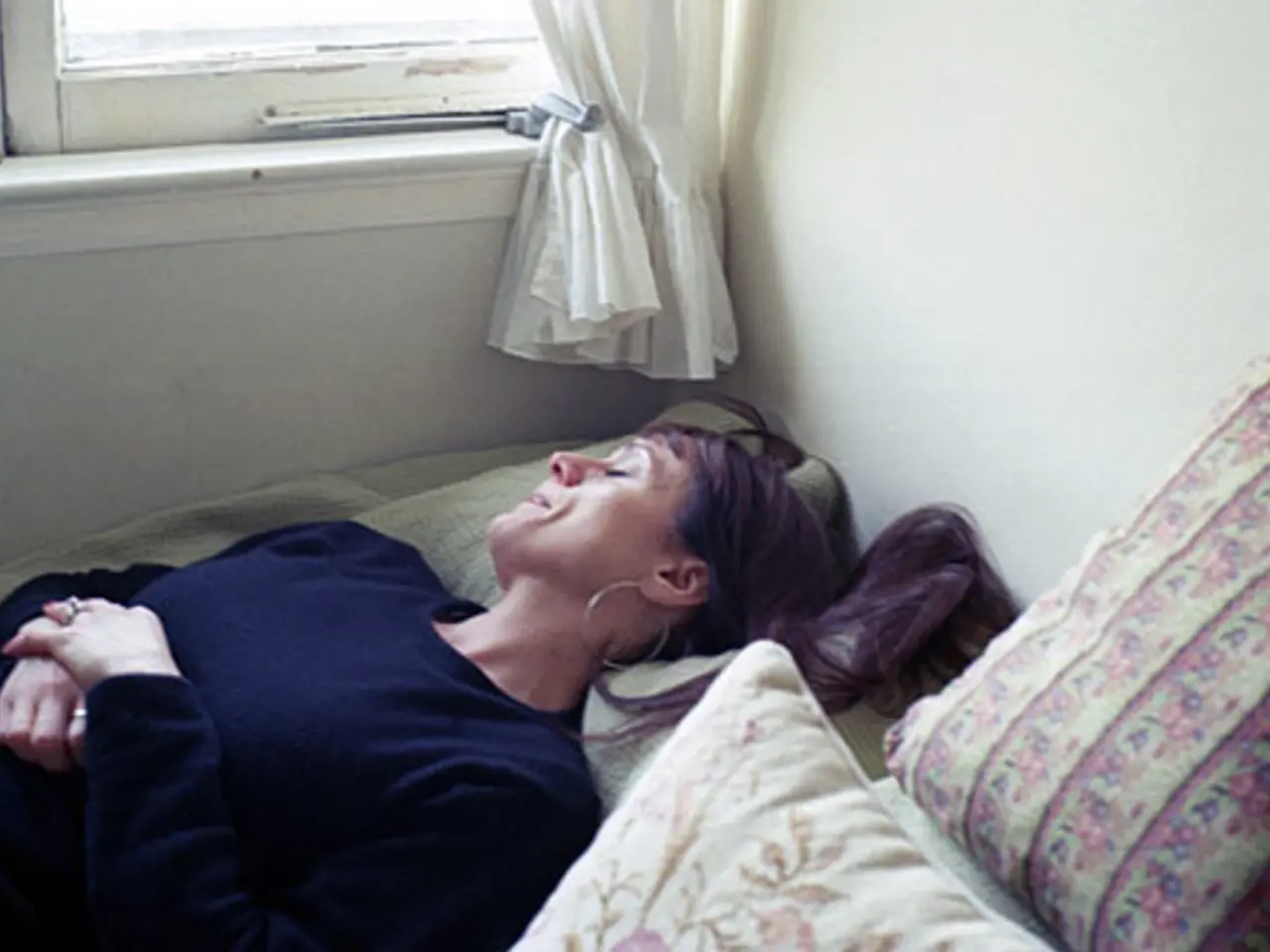Strategies for Preventing Menopause from Disrupting Your Restful Nights
Menopause, a natural transition in a woman's life, can bring about a host of changes, including sleep disturbances. As women approach this stage, fluctuating hormones can disrupt their sleep patterns [1].
During menopause, the cessation of ovulation and periods leads to a decline in estrogen and progesterone levels. These hormones play a crucial role in regulating the sleep cycle, body temperature, and mood. Lower estrogen levels reduce deep sleep and disrupt the production of serotonin and melatonin, both essential for restful sleep, while the calming effect of progesterone diminishes, leading to poorer sleep quality [1].
Common sleep disrupters during menopause include night sweats and hot flashes, anxiety and mood swings, insomnia, sleep apnea, and restless legs syndrome [1]. Night sweats and hot flashes occur due to sudden surges in body temperature, while anxiety and mood swings are a result of hormonal shifts [1]. Insomnia is often due to discomfort or racing thoughts, sleep apnea is related to airway muscle tone loss and weight gain, and restless legs syndrome affects over 50% of postmenopausal women [1].
However, there are natural alternatives to prescription sleep medications that can help improve sleep quality during menopause. Lifestyle and behavioral changes, such as regular exercise, maintaining a moderate weight, and stress reduction techniques like meditation or mindfulness, can alleviate symptoms and improve sleep [2]. Dietary adjustments, including consuming iron-rich, calcium-rich, and phytoestrogen-containing foods, may support hormonal balance and reduce symptoms [2].
Herbal supplements and aromatherapy, like valerian root, lavender, or black cohosh, are sometimes used to manage sleep issues during menopause. However, it's essential to exercise caution as scientific evidence is limited, and some supplements may cause side effects or interact with other medications. Consultation with a healthcare provider is recommended before starting any herbal treatment [2].
Mind-body therapies, such as sophrology, a relaxation method mentioned in relation to menopause, may help manage stress and improve sleep patterns [1]. Additionally, a melatonin supplement (5 mg, an hour before bed) can help signal the body that it's time to sleep [1].
Regular exercise results in significant improvements in sleep during perimenopause and menopause, and studies have shown that exercise can also reduce hot flashes in perimenopausal and menopausal women [3]. Yoga is linked to improved sleep in menopause, making it a beneficial addition to any exercise routine [4].
In conclusion, hormonal fluctuations causing night sweats, mood changes, and sleep apnea majorly drive sleep problems during menopause. Natural approaches focusing on lifestyle, diet, stress reduction, and certain herbal supplements may provide sleep support but should be used prudently and under medical advice [1][2][3]. It's important to remember that giving up sleep doesn't have to be a part of menopause; using the tips mentioned can help overcome hot flashes, balance hormones, and reset the body's internal clock for better sleep.
References:
[1] National Sleep Foundation. (2021). Menopause and Sleep. Retrieved from https://www.sleepfoundation.org/articles/menopause-and-sleep [2] Mayo Clinic. (2021). Menopause: Sleep disorders. Retrieved from https://www.mayoclinic.org/diseases-conditions/menopause/in-depth/sleep-disorders/art-20046083 [3] National Institute on Aging. (2021). Menopause and Sleep. Retrieved from https://www.nia.nih.gov/health/menopause-and-sleep [4] American College of Obstetricians and Gynecologists. (2021). Menopause: Nonhormonal Approaches to Symptom Management. Retrieved from https://www.acog.org/womens-health/faqs/menopause-nonhormonal-approaches-to-symptom-management [5] National Sleep Foundation. (2021). Sleep Apnea in Women. Retrieved from https://www.sleepfoundation.org/articles/sleep-apnea-women
- The cessation of ovulation and periods during menopause leads to decreased levels of estrogen and progesterone, hormones which regulate the sleep cycle, body temperature, and mood, thereby affecting sleep health-and-wellness.
- Women's health during menopause may be impacted by sleep disturbances, particularly night sweats, hot flashes, and insomnia, all of which can be addressed through a combination of lifestyle changes, mind-body therapies, herbal supplements, and in some cases, melatonin supplements.
- To maintain overall wellness and optimize sleep quality during menopause, it is recommended to engage in regular exercise, practice stress reduction techniques, adjust diet to include iron-rich, calcium-rich, and phytoestrogen-containing foods, and consult with healthcare providers before starting any herbal treatment or supplement regimen.




